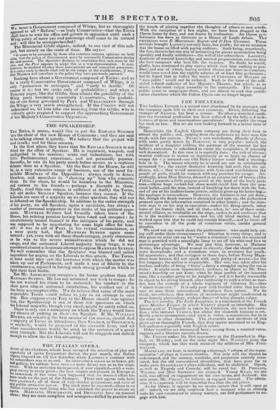THE ITALIAN OPERA.
SPITE of the elections, which have occupied the attention of play and especially of opera frequenters during the past month, the Italian Opera lingered on till last Saturday, when LAPORTIrS contract with his subscribers was at an end. So successful a season as to boxes, pit, and gallery, we seldom have seen—a more dreary one as to the stage, never. With an orchestra unsurpassed, if ever equalled—with a com- pany strong in every point—the best singers and players in Europe at his command, it has some how happened that no musical effort has been made on the port of the Manager. Three new operas only have been produced ; all of them of very slender pretensions, and none of any public attractive power. The truth must be repeated—there is no Italian composer now living who has exhibited the power to create an opera. MAntiasa, MERCADANTE, and DONIZETT1 have no musical ideas: they are mere compilers and arrangers—drilled by practice into the knack of piecing together the thoughts of others to new vends. With the exception of a few nights, we have been dragged to the Opera-house by duty, and not drawn by inclination. An Opera per- formance has been as tiresome as a House of Lords debate. The exceptions were Il Matrimonio Segreto and II Don Giovanni. These revivals brought LAPORTE ROC only fame, but profit ; for on no occasion was the house so filled with paying auditors. Such being, notoriously, the fact, there is but one way of accounting for pieces so attractive being speedily and filially withdrawn—the will of the subscribers. LAPORTE, destitute of musical knowledge and musical prepossession, esteems him the best composer who best fills the treasury. No doubt he would, gladly, have continued to play operas which cost him nothing to pro- duce, and one of which, having neither chorus nor brass instruments, would have saved Lim the nightly salaries of at least fifty performers ; but he found that to inflict the music of C1MAROSA or MozAav on " ears polite " would not be endured. Such is the taste of the self- styled refined audience of her Majesty's Theatre, but which, as to music, is the most vulgar assembly in the metropolis. The musical public cease to congregate there, and are driven to seek that gratifi- cation elsewhere which the Italian Opera can no longer impart.


























 Previous page
Previous page